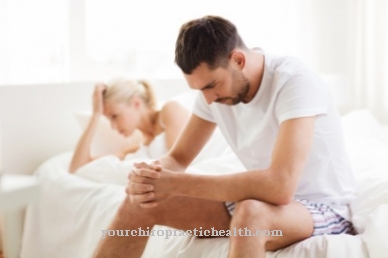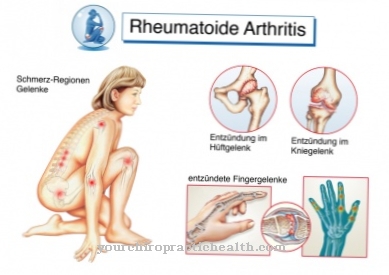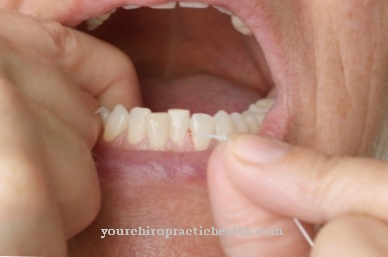chills In contrast to the general tremor, it is a strong feeling of internal and external cold, in which the muscles in particular are moved quickly and reflexively, reminding of a tremor.
What is chills?

The strong feeling of cold that is triggered by chills is based on an unconscious contraction of the body muscles. Especially the back muscles and thigh muscles are affected by the shivering.
Chills usually last for several minutes, weaken and then get stronger and weaker again at intervals. Most of the time, those affected are so exhausted that they fall into a deep sleep.
As with normal freezing, the purpose of the tremor is to be found in the heat generated by the muscle contractions. Chills often occur as part of an infectious disease such as the common cold and are often linked to the fever that is present.
causes
As already mentioned, the cause of chills is often a fever in connection with an infectious disease (cold, flu). The shaky muscle contraction is intended to bring the body temperature to a normal value of 37 ° Celsius by initiating a strong exudation.
Chills are rarely seen in Germany as part of a tropical disease such as malaria, smallpox, anthrax, plague or yellow fever. Travelers from southern regions should therefore consult a doctor if they have chills.
Furthermore, chills can also occur in the course of sunstroke or heat stroke.
Especially after traveling to tropical countries, chills such as malaria, anthrax, smallpox, yellow fever or plague should be considered. Exposure to excessive or prolonged exposure to the sun and extreme heat may result in chills due to heat stroke or sunstroke.
Below is a list of diseases that have chills as a symptom.
You can find your medication here
➔ Medicines for chills and feverDiseases with this symptom
- cold
- lung infection
- Scarlet fever
- Blood poisoning
- Tetanus
- Mushroom poisoning
- flu
- Sunstroke
- malaria
- pest
- Hypothermia
- Typhus
- heatstroke
- Yellow fever
- smallpox
- anthrax
- Pelvic inflammation
- typhus
Diagnosis & course
With questions to the patient, the doctor first gets an overview of the duration and course of the chills. He then specifically asks about possible accompanying symptoms. Information on existing illnesses, medication intake and stays in tropical regions are also important in order to classify the clinical picture.
The doctor then carries out a physical examination, which includes listening to the airways and palpating the lymph nodes. If there is any suspicion, a blood test confirms the diagnosis of bacterial or viral diseases. If necessary, a urine test and the use of an ultrasound or X-ray device follow.
Chills can accompany the entire duration of the illness, but are often isolated in viral infections after the first fever. Chills subside as the infection heals.
Complications
The chills are usually a sign of a cold or flu. In most cases, if the chills are not treated directly, it will result in a more severe cold, requiring the patient to rest and recover for several days.In the worst case, the symptom leads to hypothermia, but this only happens in very few cases.
Should chills occur, the patient should move to a warm atmosphere. Treatment is with drugs that lower fever, relieve pain, and generally combat symptoms of the flu and the common cold. It is completely normal for the patient to experience severe fatigue and aching limbs.
Warm drinks such as tea, warm milk or coffee can also help against the sudden frost. Alcohol should be avoided in conjunction with the medication taken, as the medication often contains pain relievers. Painkillers should never be introduced into the body with alcohol.
In most cases, the chills will go away after a few hours. However, if the feeling persists for several days, a doctor should be consulted who may prescribe an antibiotic in this case. This will help fight the infection.
When should you go to the doctor?
If you have chills, you don't always need to see a doctor. The unpleasant muscle tremors usually subside by themselves as soon as the underlying flu or cold is overcome. However, if the symptoms persist longer than usual and the usual measures and home remedies do not bring relief, this should be clarified by your family doctor. Severe chills, which are accompanied by symptoms such as aching limbs and exhaustion, should also be treated by a specialist.
This is especially true if the symptoms arise after a long trip to the tropics. Chills that occur for no apparent cause must also be examined by a doctor, as there may be a serious underlying condition. Chills in children, the elderly and pregnant women should always be clarified by a doctor. Otherwise you have to go to the doctor with chills if you already have another disease of the immune system or if the person concerned is generally physically weakened. If there is also a high fever, persistent vomiting or sweating, an emergency doctor should be called in immediately.
Doctors & therapists in your area
Treatment & Therapy
If the chills occur as part of a simple cold or flu-like infection, treatment by a doctor is not necessarily necessary. Warm teas and a lot of blankets help to speed up the exudation of the fever.
However, if the chills persist for several days, or if the chills are very severe, a doctor should be consulted immediately. The doctor will first conduct a detailed survey of the general and specific complaints. He will also want to know what diseases are present and what medication is being taken. For tourists from southern countries, he will also go into detail here.
He will usually begin a physical exam after that. The lungs are listened to and examined for potential inflammation. The lymph nodes should also be trimmed. Often this can be used to diagnose the cause of the chills.
If further pathogens are suspected, a blood sample should be taken, which can then indicate a possible infectious disease. A urine test, X-ray, bronchoscopy and ultrasound examination may also be necessary for further examination.
Depending on the ultimate cause, the treatment or therapy is then initiated. Antibiotic therapy can be used for certain infectious diseases. If another underlying disease is responsible for the chills, this must first be treated.
In the event of heat stroke or sunstroke, the affected person should be cooled with cold compresses or towels. Sufficient mineral-containing drinks should be drunk in order to stabilize the fluid balance and the circulation.
Outlook & forecast
In most cases, the chills do not need to be treated by a doctor. It occurs mainly with colds and flu and is a completely common symptom. Chills can also occur with infections of the gastrointestinal tract and does not necessarily have to be a health complication. In most cases this characterizes the onset of an illness and disappears again after a few hours.
The affected person should definitely warm up if they have chills. This includes warm clothing, bed rest, and hot meals or liquids. These generally help against the chills and speed up healing.
Chills can also occur if the body is severely hypothermic. In this case, treatment by the doctor is advisable in order to avoid consequential damage. A doctor should also be seen if the chills occur very often and are not related to any other illness. In this case, the chills are a sign of a weak immune system. Here, the patient can fight the chills relatively well with the help of a healthy diet and lifestyle.
In most cases, however, the chills will go away on their own and will not lead to further symptoms or complications.
You can find your medication here
➔ Medicines for chills and feverHome remedies & herbs for chills
- A sweat cure helps against chills with a fever.
- Cold calf compresses help with chills, heat stroke or sunstroke
You can do that yourself
If you have chills, you don't necessarily need to see a doctor. The symptoms can often be alleviated yourself by warming the body and supplying it with sufficient fluids. Relaxation and bed rest, as well as avoiding stress, are effective remedies for mild chills.
Teas such as elderflower tea, rose hip peel or linden blossom tea have a sweat-inducing effect and support the body in producing heat. In the case of mild chills, a hot foot bath or a warm bath with medicinal herbs such as tea tree oil or lavender is often sufficient. Chills caused by sunstroke can be relieved by using cold, damp compresses or cool yogurt compresses on the forehead and neck. Cold calf compresses or applications with cool healing clay can also help. Direct contact with the sun should be avoided until further notice.
Essential oils, especially eucalyptus and mint, help with chills from a cold or flu. Other foods such as garlic, chicory or leeks also contain substances that help with typical cold symptoms. Linden blossom tea is particularly effective and, in conjunction with the measures mentioned, should bring rapid relief from the chills. If the symptoms persist despite everything, a visit to the doctor is recommended.













.jpg)

.jpg)
.jpg)











.jpg)